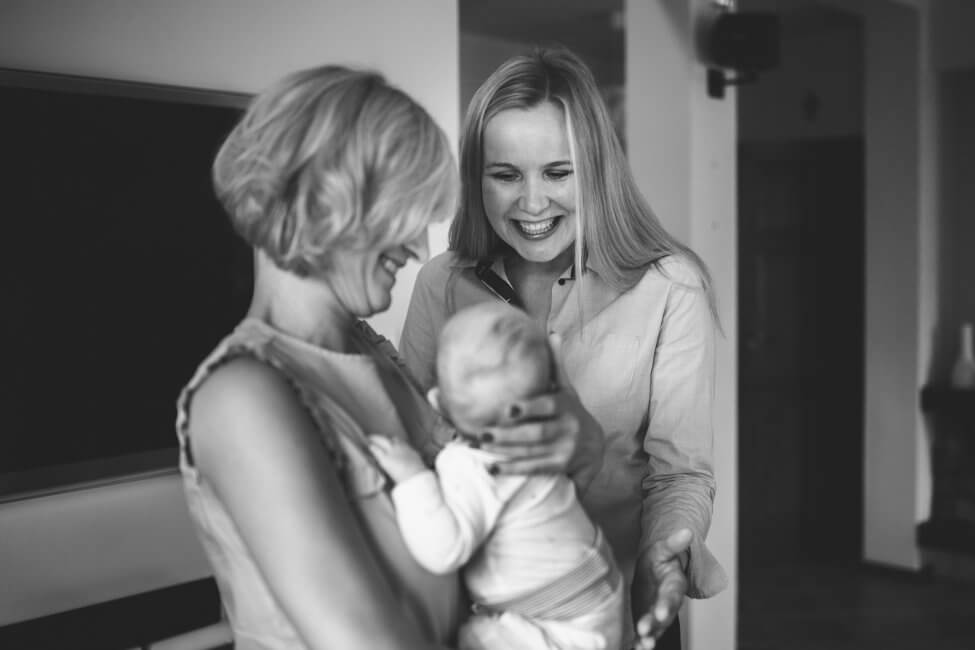


Difficulty falling asleep
Frequent waking in the night
Waking up too early
Night feeding of babies who do not need it
Too short or no naps
Switching from two naps to one or from one to none
Moving from a crib to a bed
Moving from parent’s to child’s own bed
Sleep problems caused by parent returning to work, sickness, new caregivers, travel, new siblings, etc.

A Child Sleep Consultant, with her knowledge on child’s sleep physiology and her experience, provides counsel, educates and supports parents in their attempts to improve the sleep quality of their child aged 0–6 years. The profession is believed to have emerged in Australia in the 1980s and is becoming more and more popular around the world. Along with a lactation consultant or a doula, she is yet another professional who can help exhausted and often confused parents to fully enjoy their motherhood or fatherhood.
The Consultant usually helps when a child and its family experience long-term weariness resulting from the child’s recurrent problems with falling asleep, night waking and/or too short or no naps during the day.
If parents are concerned about any aspect of their child’s sleep pattern (e.g. they feel the child generally sleeps too little, sleeps restlessly, tossing and turning or crying in its sleep, naps are too short, the child has problems falling asleep, snores or breathes irregularly during sleep, wakes up often and for a prolonged time at night, etc.), the first thing to do is always to consult a paediatrician. Some disorders that can affect sleep quality are: allergies, infant reflux, recurrent otitis, disorders involving pruritus (AD, parasite infection) or pain, breathing disorders, etc.
Only after health grounds of sleep issues have been ruled out (the paediatrician can refer your child to a specialist, e.g. a neurologist, allergist or gastroenterologist, or order further tests) can you consider so-called behavioural sleep disorders, including problems falling asleep, night waking due to the child or its parents’ incorrect behaviour which affects sleep duration and quality, e.g. parents’ inability to set limits, child’s bedtime resistance, etc. In such cases, the parents may want to contact a Child Sleep Consultant.
The choice between one-to-one cooperation (option 2 or 3 on the price list) or training does not depend on the scale of problems with the child’s sleep because in both cases we provide parents with the same theoretical knowledge. One-to-one cooperation is usually the best solution for parents who like to be “led by the hand” when introducing changes and need direct daily motivation in the form of e-mails/phone calls. Parents who are consistent and determined enough to work on their own usually opt for training – in this case they receive support via a closed FB group.
The inability to fall asleep on one’s own is often the cause of sleeping problems; however, a number of children who do not fall asleep on their own do not have any trouble with their sleep. Sometimes, taking care of the following aspects of sleep hygiene brings incredible results (children fall asleep faster and wake up at night less often, thus they do not need to learn to fall asleep on their own):
There are a number of methods (so-called behavioural techniques) that can help the child fall asleep on its own. The main difference between them is the way parents react to the child’s crying during the teaching period:
– the most extreme and controversial is the so-called “cry it out” / “extinction” method. It requires parents not to react to the crying child during bedtime; the child is put to bed in the evening, and parents only come back at a specific time in the morning, even if it cries at night. This method usually brings effects within a few days.
– “controlled crying”, “Ferberisation”, “check and console”, “fading”; one of the first versions of this method was developed by an American paediatrician, Richard Ferber, hence the name “Ferberisation”; it involves leaving the crying baby and consoling it every now and then at specific, usually progressively increasing intervals, e.g. every 3–5–7 minutes. This method is usually effective after 7–10 days.
– various types of so-called “camping out” or “fading”, in which parents gradually reduce their presence and associations with falling asleep; they are still there when the baby is falling asleep, but they move further away from the crib (this usually takes approximately 1–2 weeks). Another version of “camping out” consists in slowly moving the baby away, e.g. in the case of co-sleeping. If the baby sleeps in a crib, you gradually move it further away from the parents’ bed. In the case of older children, the baby can initially sleep on a separate mattress near the parents, and then the distance between them is increased. This method is usually effective in 1–4 weeks.
– so-called “staylistening”, which can be a method on its own or can be used to supplement other methods; in this case, parents passively accompany the child while it is crying, e.g. by holding it in their arms. This method is usually effective after 7-14 days.
– the “put up/put down” method, named and popularised by a British nurse, Tracy Hogg, involves putting the baby up when it cries and putting it down right after it stops crying. This method is usually effective after 7-14 days.
– very slow (spread over weeks/months) withdrawal of assisting the baby while falling asleep with mixed methods, involving elements of e.g. camping out or very gentle departure from the association of breastfeeding with falling asleep (e.g. the method developed by an American parenting educator, Elizabeth Pantley). This method usually brings effects after a few weeks up to a few months.
… and other methods, including combinations of the above.
In case the child needs to learn to fall asleep on its own in order to improve sleep quality, at GoodNight Sleep Consulting we offer parents our own methods to do that based on the belief that you should never leave your baby alone to cry it out.
Most children gradually grow out of sleep problems. However, a number of studies show that this is not always the case, and sometimes, unresolved infant sleep problems can last until preschool or school age. Sleep is one of our basic physiological needs (in Maslow’s hierarchy of needs, it is next to food, water and oxygen), therefore, a one-night or – more importantly – chronic sleep loss has its specific, scientifically-proven consequences for both physical and mental health. So first of all, it is the parents that should ask themselves if, and how long, they can wait and if their child will actually grow out of these sleep problems. Sleep deprivation often has tremendous and nearly unbearable effects in the long run (over the course of several months or years).
Chronic sleep deprivation in adults has been well documented in a number of studies. What we know is that sleep loss leads to a bad mood, concentration problems, vision problems, longer reaction time, micro-sleep during the day which can affect daily activities or even cause risk (e.g. when driving), memory lapses, schematic thinking leading to making bad decisions, and emotional disturbances, e.g. troubled interpersonal relations or increased aggression. Sleep deprivation can often cause negative changes to our immune system, increase the risk of obesity, diabetes or heart diseases. After 20–25 hours without sleep, the decreased general performance is comparable to a blood alcohol level of 0.10%. The consequences of chronic sleep deprivation or light sleep for a few days in a row accumulate and have similar effects to a single sleeplessness period lasting for several dozen hours.
More and more studies also show that interrupted or insufficient sleep can have serious, far-reaching consequences (partly similar to the effects in adults) for babies: a negative influence on their cognitive development (e.g. learning, memory consolidation), mood regulation (e.g. chronic irritability, poor emotional regulation), attention and behaviour (e.g. aggression, hyperactivity, poor impulse control), health (metabolism and immunity, accidental injuries) and general well-being.
of the www.twojadobranocka.pl website
Chapter I
INITIAL PROVISIONS
§ 1
Service Provider
§ 2
Definitions
Any references to the following terms in these Rules shall mean respectively:
§ 3
Scope of use
§ 4
Technical requirements
The use of the Website requires:
§ 5
Access
Chapter II
ORDER
§ 6
Telesales
§ 7
Payment
Chapter III
RULES OF USING TRAINING COURSES
71
Rules of gaining access to Training Courses
§ 72
Rules of using Training Courses
Chapter IV
TERMINATION, NOTICE, WITHDRAWAL, WARRANTY AND GUARANTEE
§ 8
Termination and notice
§ 9
Withdrawal from the Agreement
§ 10
Complaints
§ 11
Guarantee
Chapter V
PRIVACY POLICY
§ 12
Personal data
§ 13
Rights of data subjects
With regard to the processing of personal data by the Controller, the Service Recipient has the following rights:
§ 14
Cookies
Chapter VI
OTHER PROVISIONS
§ 15
Copyright
§ 16
Reservations
§ 17
Amendment of the Rules
§ 18
Additional information
Appendix: TEMPLATE FOR WITHDRAWAL FROM THE AGREEMENT (this form must be filled in and returned only in the case of an intention to withdraw from the Agreement)
(*) Delete as appropriate.

Agnieszka and Edyta have been working in the field for 5 and 2 years, respectively, helping parents deal with their babies’ sleep patterns. So far, they have worked with almost 2000 families (during one-to-one consultation as well as trainings and workshops) from 20 countries on 5 continents. Services are also offered in English.

All parents raise their children in the spirit of the values they believe in, their parenting philosophy or simply according to what their intuition tells them. Every family and every child is different. There is no universal parenting model that can guarantee your child will develop the way it should. Every step of the way, at GoodNight Sleep Consulting we fully respect the parents’ rules and let them do things according to what they believe is right.

GoodNight Sleep Consulting cooperates with psychologists, psychotherapists, child psychologists, dieticians, therapists, speech therapists, breastfeeding advocates, etc. and if necessary, we can help you put in touch with one of these specialists.

Od kilku lat (Agnieszka od 5 a Edyta od 2 lat) pracujemy z sukcesami pomagając rodzicom borykającymi się ze snem swojego dziecka. Na koncie mamy współpracę z aktualnie ponad 1500 rodzin (w ramach konsultacji indywidualnych oraz szkoleń i warsztatów) z 20 krajów i na 5 kontynentach. Możliwa jest współpraca w języku angielskim.



